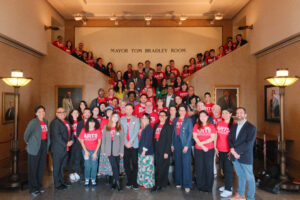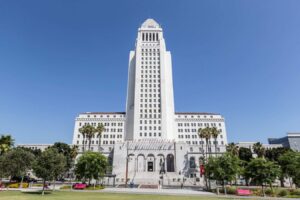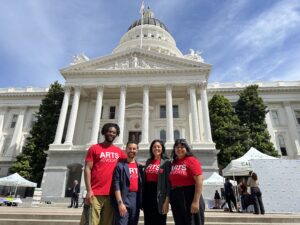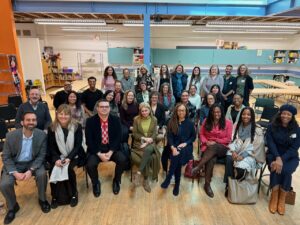Dear Arts Advocates,
We are living through an extraordinarily difficult moment for arts and culture in this country. On May 2, 2025, the Trump administration proposed completely eliminating funding for the National Endowment for the Arts (NEA), National Endowment for the Humanities (NEH), Institute of Museum and Library Services (IMLS), PBS, and NPR in the 2026 federal budget. Just hours later, hundreds of arts organizations across the U.S. (including many in Los Angeles) received abrupt notices from the NEA terminating their grants.
These top-down decisions have had devastating ripple effects on local organizations like Armory Center for the Arts Clockshop, and Angel City Chorale – which have collectively lost hundreds of thousands of dollars in committed funding. We see you, we stand with you, and we urge you to share your experiences and seek support. If you’re facing grant cancellations or disruptions, we encourage you to report it HERE and appeal the decision. You can also monitor ongoing federal executive orders impacting nonprofits HERE.
Despite this harmful and infuriating situation, we know that the arts community has repeatedly proven itself to be one of the most resilient, united, and innovative groups of people in the world. We have been embracing that collective spirit over the last few months – having traveled to Washington, D.C. with key partners to meet with Senators and members of Congress, underscoring the urgent need to resist these harmful policies and uplift the creative workers who have long served their communities through education, expression, and cultural connection.
That spirit is alive in California and Los Angeles, too, where hundreds of advocates have stayed engaged to protect our cultural assets and emphasize that the time to lead at the regional level is now. Here’s a week-by-week look at what we accomplished together this Arts Month.

\Week 1: Laying the Foundation
Unveiling the 2025–27 Policy & Advocacy Agenda
Arts for LA proudly launched a new agenda, Roots, Recovery, and Regeneration, addressing the many challenges facing LA’s creative economy—historic underfunding, pandemic impacts, and recent wildfires. This agenda, developed in collaboration with our arts community, aims to deepen connections across the sector, share knowledge to strengthen capacity and preparedness, and drive grassroots and grasstops organizing for equitable recovery and growth.
Engaging Emerging Artists
Arts for LA participated in Center Theatre Group’s “Going Pro” Career Fair, supporting over 200 students and early-career professionals transitioning into the theatre and live entertainment industry. Additionally, we partnered with the City of Santa Monica Cultural Affairs to kick off Arts, Culture, and Creativity Month, celebrating the vibrancy of our local arts scene and offering a narrative building workshop.

Week 2: Amplifying Voices at City Hall
Arts Advocacy Day at LA City Hall
On April 10, Arts for LA convened over 100 artists, administrators, and community members at LA City Hall to engage with local elected officials on critical issues:
- Sustained and increased arts funding for accessible programming.
- Streamlining contracts and payments for arts organizations and independent contractors.
- Implementing freelance worker protections to support LA’s creative workforce.
For many creatives, this was their first time meeting with an elected official. We are continuing to build a deep network of arts advocates who can drive change in their communities.
Creative Worker Series
We documented personal stories from freelance and gig workers in the creative economy. These stories emphasized the impact of creative work and what a sustainable living wage would mean for the field.

Week 3: Addressing Budget Challenges
City Budget Concerns
Facing a nearly $1 billion deficit, the Mayor’s proposed FY25–26 budget includes potential layoffs of approximately 1,600 city employees, with 14 positions from the Department of Cultural Affairs at risk. Proposed cuts also threaten grants, cultural programming, and administrative positions, potentially leading to a loss of 55 grantees and over 355 creative jobs. Read more here.
Want to take action to oppose these cuts? Send a letter!
County Budget Reductions
Los Angeles County’s $47.9 billion Recommended Budget for FY 2025–26 reflects a $1.3 billion decrease from the previous year. The proposal includes an 11% reduction (approximately $609,000) to the Organizational Grant Program, which could have devastating effects on arts and culture organizations. Read more here.
Send a letter to the Board of Supervisors and ask them to oppose these cuts.

Week 4: Statewide Advocacy
Arts Advocacy Day in Sacramento
Arts for LA traveled to California’s Capitol to take part in CA for the Arts’ third-annual summit “Health, Healing, and Hope” to connect with peers from across the state and meet with legislators to advocate for key issues impacting our creative communities. Our advocacy focused on restoring $5 million to the California Arts Council, ensuring equitable implementation of Prop 28, supporting a $750 million film tax incentive to keep jobs and productions in L.A., and advancing protections for freelance workers.
We spoke with folks like Dr. Maria Rosario Jackson (Former Chair, NEA), Lauren Pizer Mains (Arts Consultant to Sen. Ben Allen), Senator Maria Elena Durazo, and Assemblymember Nick Schultz.
Entertainment Equity Alliance Career Expo
Arts for LA tabled at the second annual Careers in Entertainment Expo, organized by the Entertainment Equity Alliance – a one-day interactive event that brought together 2,500 students and early career professionals to explore opportunities available in the entertainment industry.
Prop 28 Accountability
In response to mounting concerns over the misuse of Proposition 28 funds, Assemblymember Isaac Bryan formally requested a state audit of LAUSD. This follows a recently filed lawsuit alleging that LAUSD diverted funds meant to expand arts education in violation of the law’s intent.
Arts for LA has partnered with Create CA to launch a grassroots letter campaign in support of Assemblymember Bryan’s audit request. In just one week, over 1,800 letters have been sent to elected officials urging oversight, and a video summarizing the lawsuit and concerns around LAUSD has already surpassed 7,000 views, underscoring widespread public interest in accountability.
Help us spread the word – send a letter to support an audit.

Week 5: Embracing Innovation and Collaboration
LA County Arts Datathon: Intelligence
Arts for LA joined LA County’s Arts Datathon to support hands-on workshops designed to help our arts and culture communities understand how to use generative AI tools effectively and ethically.
2025 Digital Equity Advocacy Day
Arts for LA traveled back to Sacramento to join 100 advocates from across California for the 2025 Digital Equity Advocacy Day. We attended committee hearings and led legislative office meetings to stand up for equitable access to affordable broadband. This is a part of Arts for LA’s commitment to working across sectors and issue areas on the topics that impact our historically under-resourced students, educators and arts organizations.
Dance and Dialogue: Celebrate LA
Our staff celebrated the culmination of Arts Month by partnering with Dance and Dialogue to “Celebrate LA” through an evening of dance. High school students from across the region showcased their diverse talents and were joined by the Los Angeles Jazz Company to provide much needed joy to over 1,000 attendees – including Glorya Kaufman, Derek Hough, and many others.
LA28 Cultural Olympiad
After 8 months of community engagement, data collection, and analysis, led by the LA County Department of Arts and Culture in partnership with Arts for LA, LA Commons, and Community Arts Resources – we are proud to share a comprehensive report detailing aspirations, concerns, and strategies from the field to build a lasting cultural legacy leading up to and during the 2028 Olympic and Paralympic Games.
Looking Ahead
As we reflect on a month of significant achievements and ongoing challenges, we remain committed to advocating for the arts and supporting our creative communities. We invite you to stay engaged and informed:
Together, we can continue to champion the arts and ensure a vibrant, equitable future for all.
In solidarity,
Arts for LA




